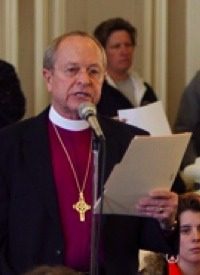
America’s most high-profile homosexual clergyman, Episcopal Bishop Gene Robinson, came out in early February with a bit of audacious scriptural interpretation meant to justify the actions of men and women who wish to practice both the Christian faith as well as a lifestyle condemned in the Bible. Robinson was given the opportunity to flesh out his “inclusive” theology during an appearance at the National Press Club, where he helped to announce the launch of a pro-homosexual “American Prayer Hour,” designed to “affirm inclusive values and call on all nations … to decriminalize the lives of gay, lesbian, bisexual, and transgender people.”
Following a news conference announcing the pro-homosexual religious initiative, Robinson was approached by a reporter from the Cybercast News Service, who questioned the bishop about a particular scripture passage, Romans 1:22-27, which Christians since the early Church era have taken to be a strong admonition against homosexual behavior. Asked whether the Apostle Paul was right in his assertion that homosexual relations were against the laws of nature set up by God, Robinson said that a proper response to the question would take about “two days to answer.”
Nonetheless, said the Episcopal Church’s first openly homosexual bishop, “I’ll try to give you the Cliff’s Notes version” — which included the news that the notion someone could be born with a homosexual orientation is a fairly recent revelation, no more than 125 years old. Robinson explained that in the passage in question, “St. Paul was talking about people that he understood to be heterosexual engaging in same-sex acts. It never occurred to anyone in ancient times that a certain minority of us would be born being affectionally [sic] oriented to people of the same sex.”
Thus, “it did seem like against their nature to be doing so,” said Robinson, referring to Paul’s admonition that those involved in homosexual acts were exchanging natural relations for unnatural ones.
Robinson argued that more than anything, Paul was using the Romans 1 passage to condemn a Roman custom in which older men would take in younger boys for the purposes of sex. “No one is arguing for [child abuse] today,” he assured the reporter. “We would all be against that. We would all agree with St. Paul on that.”
Robinson asserted that the “real question when you look at scripture is, ‘What did it mean to the person who wrote it? What did it mean for the audience to whom it was written?… And in this case, I would say, the things that St. Paul was against, I’m against, too.” Which means that, as far as Robinson is concerned, Paul was only condemning homosexual acts committed by individuals who were not born “affectionally oriented to people of the same sex.”
Robinson added that “the question is, are there any answers there for what we’re asking today, which is the rightfulness of faithful monogamous lifelong-intentioned relationships between people of the same sex, and the bible simply does not address that.”
In an effort to nail the bishop down on his slippery explanation to what Christians have always taken to be a straight-forward censure of any and all homosexual acts, the reporter asked Robinson if he thought the apostle Paul was incorrectly condemning homosexuality. To which the bishop responded, “No, I think St. Paul was absolutely correct in his own context given what he knew, and given the behavior which he was describing.”
Concluded Robinson, “The questions we’re asking today are about a completely different set of circumstances” — which was his way of saying that the original rules toward homosexuality have changed as society’s understanding has “evolved,” and what God proscribed as sinful behavior throughout the entirety of the Old and New Testaments has now become an act that Christians must join the rest of society in accepting, embracing, and even celebrating.
While Robinson’s interpretation of Scripture has been aggressively voiced by a small core of homosexuals who call themselves Christians, their behavior continues to be condemned as sin by both Protestant and Catholic Church leaders. For example, the Catechism of the Catholic Church describes homosexual tendencies as “objectively disordered,” while homosexual acts are condemned as “contrary to the natural law” and can “under no circumstances” be approved.
One of the most vocal critics of the theology that Episcopal leaders like Robinson have embraced concerning sexuality has been Nicholas Thomas Wright, a biblical scholar and Bishop of Durham in the Church of England. Writing in the London Times, Wright noted that “Jewish, Christian, and Muslim teachers have always insisted that lifelong man-plus-woman marriage is the proper context for sexual intercourse. This is not an arbitrary rule, dualistic in overtone and killjoy in intention. It is a deep structural reflection of the belief in a creator God who has entered into covenant both with his creation and with his people.”
He added that it is “the uniform teaching of the whole Bible, of Jesus himself, and of the entire Christian tradition.”
Photo of Bishop Gene Robinson: AP Images



